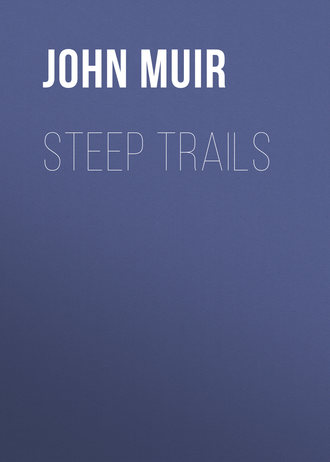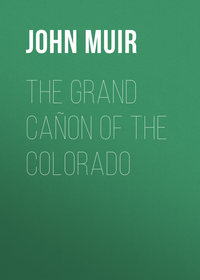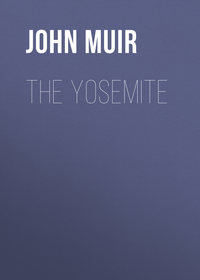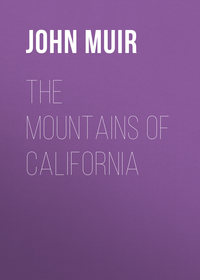 полная версия
полная версияSteep Trails
After I was above the dwarf pines, it was fine practice pushing up the broad unbroken slopes of snow, alone in the solemn silence of the night. Half the sky was clouded; in the other half the stars sparkled icily in the keen, frosty air; while everywhere the glorious wealth of snow fell away from the summit of the cone in flowing folds, more extensive and continuous than any I had ever seen before. When day dawned the clouds were crawling slowly and becoming more massive, but gave no intimation of immediate danger, and I pushed on faithfully, though holding myself well in hand, ready to return to the timber; for it was easy to see that the storm was not far off. The mountain rises ten thousand feet above the general level of the country, in blank exposure to the deep upper currents of the sky, and no labyrinth of peaks and canyons I had ever been in seemed to me so dangerous as these immense slopes, bare against the sky.
The frost was intense, and drifting snow dust made breathing at times rather difficult. The snow was as dry as meal, and the finer particles drifted freely, rising high in the air, while the larger portions of the crystals rolled like sand. I frequently sank to my armpits between buried blocks of loose lava, but generally only to my knees. When tired with walking I still wallowed slowly upward on all fours. The steepness of the slope—thirty-five degrees in some places—made any kind of progress fatiguing, while small avalanches were being constantly set in motion in the steepest places. But the bracing air and the sublime beauty of the snowy expanse thrilled every nerve and made absolute exhaustion impossible. I seemed to be walking and wallowing in a cloud; but, holding steadily onward, by half-past ten o'clock I had gained the highest summit.
I held my commanding foothold in the sky for two hours, gazing on the glorious landscapes spread maplike around the immense horizon, and tracing the outlines of the ancient lava-streams extending far into the surrounding plains, and the pathways of vanished glaciers of which Shasta had been the center. But, as I had left my coat in camp for the sake of having my limbs free in climbing, I soon was cold. The wind increased in violence, raising the snow in magnificent drifts that were drawn out in the form of wavering banners blowing in the sun. Toward the end of my stay a succession of small clouds struck against the summit rocks like drifting icebergs, darkening the air as they passed, and producing a chill as definite and sudden as if ice-water had been dashed in my face. This is the kind of cloud in which snow-flowers grow, and I turned and fled.
Finding that I was not closely pursued, I ventured to take time on the way down for a visit to the head of the Whitney Glacier and the "Crater Butte." After I had reached the end of the main summit ridge the descent was but little more than one continuous soft, mealy, muffled slide, most luxurious and rapid, though the hissing, swishing speed attained was obscured in great part by flying snow dust—a marked contrast to the boring seal-wallowing upward struggle. I reached camp about an hour before dusk, hollowed a strip of loose ground in the lee of a large block of red lava, where firewood was abundant, rolled myself in my blankets, and went to sleep.
Next morning, having slept little the night before the ascent and being weary with climbing after the excitement was over, I slept late. Then, awaking suddenly, my eyes opened on one of the most beautiful and sublime scenes I ever enjoyed. A boundless wilderness of storm clouds of different degrees of ripeness were congregated over all the lower landscape for thousands of square miles, colored gray, and purple, and pearl, and deep-glowing white, amid which I seemed to be floating; while the great white cone of the mountain above was all aglow in the free, blazing sunshine. It seemed not so much an ocean as a land of clouds—undulating hill and dale, smooth purple plains, and silvery mountains of cumuli, range over range, diversified with peak and dome and hollow fully brought out in light and shade.
I gazed enchanted, but cold gray masses, drifting like dust on a wind-swept plain, began to shut out the light, forerunners of the coming storm I had been so anxiously watching. I made haste to gather as much wood as possible, snugging it as a shelter around my bed. The storm side of my blankets was fastened down with stakes to reduce as much as possible the sifting-in of drift and the danger of being blown away. The precious bread sack was placed safely as a pillow, and when at length the first flakes fell I was exultingly ready to welcome them. Most of my firewood was more than half rosin and would blaze in the face of the fiercest drifting; the winds could not demolish my bed, and my bread could be made to last indefinitely; while in case of need I had the means of making snowshoes and could retreat or hold my ground as I pleased.
Presently the storm broke forth into full snowy bloom, and the thronging crystals darkened the air. The wind swept past in hissing floods, grinding the snow into meal and sweeping down into the hollows in enormous drifts all the heavier particles, while the finer dust was sifted through the sky, increasing the icy gloom. But my fire glowed bravely as if in glad defiance of the drift to quench it, and, notwithstanding but little trace of my nest could be seen after the snow had leveled and buried it, I was snug and warm, and the passionate uproar produced a glad excitement.
Day after day the storm continued, piling snow on snow in weariless abundance. There were short periods of quiet, when the sun would seem to look eagerly down through rents in the clouds, as if to know how the work was advancing. During these calm intervals I replenished my fire—sometimes without leaving the nest, for fire and woodpile were so near this could easily be done—or busied myself with my notebook, watching the gestures of the trees in taking the snow, examining separate crystals under a lens, and learning the methods of their deposition as an enduring fountain for the streams. Several times, when the storm ceased for a few minutes, a Douglas squirrel came frisking from the foot of a clump of dwarf pines, moving in sudden interrupted spurts over the bossy snow; then, without any apparent guidance, he would dig rapidly into the drift where were buried some grains of barley that the horses had left. The Douglas squirrel does not strictly belong to these upper woods, and I was surprised to see him out in such weather. The mountain sheep also, quite a large flock of them, came to my camp and took shelter beside a clump of matted dwarf pines a little above my nest.
The storm lasted about a week, but before it was ended Sisson became alarmed and sent up the guide with animals to see what had become of me and recover the camp outfit. The news spread that "there was a man on the mountain," and he must surely have perished, and Sisson was blamed for allowing any one to attempt climbing in such weather; while I was as safe as anybody in the lowlands, lying like a squirrel in a warm, fluffy nest, busied about my own affairs and wishing only to be let alone. Later, however, a trail could not have been broken for a horse, and some of the camp furniture would have had to be abandoned. On the fifth day I returned to Sisson's, and from that comfortable base made excursions, as the weather permitted, to the Black Butte, to the foot of the Whitney Glacier, around the base of the mountain, to Rhett and Klamath Lakes, to the Modoc region and elsewhere, developing many interesting scenes and experiences.
But the next spring, on the other side of this eventful winter, I saw and felt still more of the Shasta snow. For then it was my fortune to get into the very heart of a storm, and to be held in it for a long time.
On the 28th of April 1875 I led a party up the mountain for the purpose of making a survey of the summit with reference to the location of the Geodetic monument. On the 30th, accompanied by Jerome Fay, I made another ascent to make some barometrical observations, the day intervening between the two ascents being devoted to establishing a camp on the extreme edge of the timberline. Here, on our red trachyte bed, we obtained two hours of shallow sleep broken for occasional glimpses of the keen, starry night. At two o'clock we rose, breakfasted on a warmed tin-cupful of coffee and a piece of frozen venison broiled on the coals, and started for the summit. Up to this time there was nothing in sight that betokened the approach of a storm; but on gaining the summit, we saw toward Lassen's Butte hundreds of square miles of white cumuli boiling dreamily in the sunshine far beneath us, and causing no alarm.
The slight weariness of the ascent was soon rested away, and our glorious morning in the sky promised nothing but enjoyment. At 9 a.m. the dry thermometer stood at 34 degrees in the shade and rose steadily until at 1 p.m. it stood at 50 degrees, probably influenced somewhat by radiation from the sun-warmed cliffs. A common bumblebee, not at all benumbed, zigzagged vigorously about our heads for a few moments, as if unconscious of the fact that the nearest honey flower was a mile beneath him.
In the mean time clouds were growing down in Shasta Valley—massive swelling cumuli, displaying delicious tones of purple and gray in the hollows of their sun-beaten bosses. Extending gradually southward around on both sides of Shasta, these at length united with the older field towards Lassen's Butte, thus encircling Mount Shasta in one continuous cloud zone. Rhett and Klamath Lakes were eclipsed beneath clouds scarcely less brilliant than their own silvery disks. The Modoc Lava Beds, many a snow-laden peak far north in Oregon, the Scott and Trinity and Siskiyou Mountains, the peaks of the Sierra, the blue Coast Range, Shasta Valley, the dark forests filling the valley of the Sacramento, all in turn were obscured or buried, leaving the lofty cone on which we stood solitary in the sunshine between two skies—a sky of spotless blue above, a sky of glittering cloud beneath. The creative sun shone glorious on the vast expanse of cloudland; hill and dale, mountain and valley springing into existence responsive to his rays and steadily developing in beauty and individuality. One huge mountain-cone of cloud, corresponding to Mount Shasta in these newborn cloud ranges, rose close alongside with a visible motion, its firm, polished bosses seeming so near and substantial that we almost fancied that we might leap down upon them from where we stood and make our way to the lowlands. No hint was given, by anything in their appearance, of the fleeting character of these most sublime and beautiful cloud mountains. On the contrary they impressed one as being lasting additions to the landscape.
The weather of the springtime and summer, throughout the Sierra in general, is usually varied by slight local rains and dustings of snow, most of which are obviously far too joyous and life-giving to be regarded as storms—single clouds growing in the sunny sky, ripening in an hour, showering the heated landscape, and passing away like a thought, leaving no visible bodily remains to stain the sky. Snowstorms of the same gentle kind abound among the high peaks, but in spring they not unfrequently attain larger proportions, assuming a violence and energy of expression scarcely surpassed by those bred in the depths of winter. Such was the storm now gathering about us.
It began to declare itself shortly after noon, suggesting to us the idea of at once seeking our safe camp in the timber and abandoning the purpose of making an observation of the barometer at 3 p.m.,—two having already been made, at 9 a.m., and 12 m., while simultaneous observations were made at Strawberry Valley. Jerome peered at short intervals over the ridge, contemplating the rising clouds with anxious gestures in the rough wind, and at length declared that if we did not make a speedy escape we should be compelled to pass the rest of the day and night on the summit. But anxiety to complete my observations stifled my own instinctive promptings to retreat, and held me to my work. No inexperienced person was depending on me, and I told Jerome that we two mountaineers should be able to make our way down through any storm likely to fall.
Presently thin, fibrous films of cloud began to blow directly over the summit from north to south, drawn out in long fairy webs like carded wool, forming and dissolving as if by magic. The wind twisted them into ringlets and whirled them in a succession of graceful convolutions like the outside sprays of Yosemite Falls in flood time; then, sailing out into the thin azure over the precipitous brink of the ridge they were drifted together like wreaths of foam on a river. These higher and finer cloud fabrics were evidently produced by the chilling of the air from its own expansion caused by the upward deflection of the wind against the slopes of the mountain. They steadily increased on the north rim of the cone, forming at length a thick, opaque, ill-defined embankment from the icy meshes of which snow-flowers began to fall, alternating with hail. The sky speedily darkened, and just as I had completed my last observation and boxed my instruments ready for the descent, the storm began in serious earnest. At first the cliffs were beaten with hail, every stone of which, as far as I could see, was regular in form, six-sided pyramids with rounded base, rich and sumptuous-looking, and fashioned with loving care, yet seemingly thrown away on those desolate crags down which they went rolling, falling, sliding in a network of curious streams.
After we had forced our way down the ridge and past the group of hissing fumaroles, the storm became inconceivably violent. The thermometer fell 22 degrees in a few minutes, and soon dropped below zero. The hail gave place to snow, and darkness came on like night. The wind, rising to the highest pitch of violence, boomed and surged amid the desolate crags; lightning flashes in quick succession cut the gloomy darkness; and the thunders, the most tremendously loud and appalling I ever heard, made an almost continuous roar, stroke following stroke in quick, passionate succession, as though the mountain were being rent to its foundations and the fires of the old volcano were breaking forth again.
Could we at once have begun to descend the snow slopes leading to the timber, we might have made good our escape, however dark and wild the storm. As it was, we had first to make our way along a dangerous ridge nearly a mile and a half long, flanked in many places by steep ice-slopes at the head of the Whitney Glacier on one side and by shattered precipices on the other. Apprehensive of this coming darkness, I had taken the precaution, when the storm began, to make the most dangerous points clear to my mind, and to mark their relations with reference to the direction of the wind. When, therefore, the darkness came on, and the bewildering drift, I felt confident that we could force our way through it with no other guidance. After passing the "Hot Springs" I halted in the lee of a lava-block to let Jerome, who had fallen a little behind, come up. Here he opened a council in which, under circumstances sufficiently exciting but without evincing any bewilderment, he maintained, in opposition to my views, that it was impossible to proceed. He firmly refused to make the venture to find the camp, while I, aware of the dangers that would necessarily attend our efforts, and conscious of being the cause of his present peril, decided not to leave him.
Our discussions ended, Jerome made a dash from the shelter of the lava-block and began forcing his way back against the wind to the "Hot Springs," wavering and struggling to resist being carried away, as if he were fording a rapid stream. After waiting and watching in vain for some flaw in the storm that might be urged as a new argument in favor of attempting the descent, I was compelled to follow. "Here," said Jerome, as we shivered in the midst of the hissing, sputtering fumaroles, "we shall be safe from frost." "Yes," said I, "we can lie in this mud and steam and sludge, warm at least on one side; but how can we protect our lungs from the acid gases, and how, after our clothing is saturated, shall we be able to reach camp without freezing, even after the storm is over? We shall have to wait for sunshine, and when will it come?"
The tempered area to which we had committed ourselves extended over about one fourth of an acre; but it was only about an eighth of an inch in thickness, for the scalding gas jets were shorn off close to the ground by the oversweeping flood of frosty wind. And how lavishly the snow fell only mountaineers may know. The crisp crystal flowers seemed to touch one another and fairly to thicken the tremendous blast that carried them. This was the bloom-time, the summer of the cloud, and never before have I seen even a mountain cloud flowering so profusely.
When the bloom of the Shasta chaparral is falling, the ground is sometimes covered for hundreds of square miles to a depth of half an inch. But the bloom of this fertile snow cloud grew and matured and fell to a depth of two feet in a few hours. Some crystals landed with their rays almost perfect, but most of them were worn and broken by striking against one another, or by rolling on the ground. The touch of these snow-flowers in calm weather is infinitely gentle—glinting, swaying, settling silently in the dry mountain air, or massed in flakes soft and downy. To lie out alone in the mountains of a still night and be touched by the first of these small silent messengers from the sky is a memorable experience, and the fineness of that touch none will forget. But the storm-blast laden with crisp, sharp snow seems to crush and bruise and stupefy with its multitude of stings, and compels the bravest to turn and flee.
The snow fell without abatement until an hour or two after what seemed to be the natural darkness of the night. Up to the time the storm first broke on the summit its development was remarkably gentle. There was a deliberate growth of clouds, a weaving of translucent tissue above, then the roar of the wind and the thunder, and the darkening flight of snow. Its subsidence was not less sudden. The clouds broke and vanished, not a crystal was left in the sky, and the stars shone out with pure and tranquil radiance.
During the storm we lay on our backs so as to present as little surface as possible to the wind, and to let the drift pass over us. The mealy snow sifted into the folds of our clothing and in many places reached the skin. We were glad at first to see the snow packing about us, hoping it would deaden the force of the wind, but it soon froze into a stiff, crusty heap as the temperature fell, rather augmenting our novel misery.
When the heat became unendurable, on some spot where steam was escaping through the sludge, we tried to stop it with snow and mud, or shifted a little at a time by shoving with our heels; for to stand in blank exposure to the fearful wind in our frozen-and-broiled condition seemed certain death. The acrid incrustations sublimed from the escaping gases frequently gave way, opening new vents to scald us; and, fearing that if at any time the wind should fall, carbonic acid, which often formed a considerable portion of the gaseous exhalations of volcanoes, might collect in sufficient quantities to cause sleep and death, I warned Jerome against forgetting himself for a single moment, even should his sufferings admit of such a thing.
Accordingly, when during the long, dreary watches of the night we roused from a state of half-consciousness, we called each other by name in a frightened, startled way, each fearing the other might be benumbed or dead. The ordinary sensations of cold give but a faint conception of that which comes on after hard climbing with want of food and sleep in such exposure as this. Life is then seen to be a fire, that now smoulders, now brightens, and may be easily quenched. The weary hours wore away like dim half-forgotten years, so long and eventful they seemed, though we did nothing but suffer. Still the pain was not always of that bitter, intense kind that precludes thought and takes away all capacity for enjoyment. A sort of dreamy stupor came on at times in which we fancied we saw dry, resinous logs suitable for campfires, just as after going days without food men fancy they see bread.
Frozen, blistered, famished, benumbed, our bodies seemed lost to us at times—all dead but the eyes. For the duller and fainter we became the clearer was our vision, though only in momentary glimpses. Then, after the sky cleared, we gazed at the stars, blessed immortals of light, shining with marvelous brightness with long lance rays, near-looking and new-looking, as if never seen before. Again they would look familiar and remind us of stargazing at home. Oftentimes imagination coming into play would present charming pictures of the warm zone below, mingled with others near and far. Then the bitter wind and the drift would break the blissful vision and dreary pains cover us like clouds. "Are you suffering much?" Jerome would inquire with pitiful faintness. "Yes," I would say, striving to keep my voice brave, "frozen and burned; but never mind, Jerome, the night will wear away at last, and tomorrow we go a-Maying, and what campfires we will make, and what sunbaths we will take!"
The frost grew more and more intense, and we became icy and covered over with a crust of frozen snow, as if we had lain cast away in the drift all winter. In about thirteen hours—every hour like a year—day began to dawn, but it was long ere the summit's rocks were touched by the sun. No clouds were visible from where we lay, yet the morning was dull and blue, and bitterly frosty; and hour after hour passed by while we eagerly watched the pale light stealing down the ridge to the hollow where we lay. But there was not a trace of that warm, flushing sunrise splendor we so long had hoped for.
As the time drew near to make an effort to reach camp, we became concerned to know what strength was left us, and whether or no we could walk; for we had lain flat all this time without once rising to our feet. Mountaineers, however, always find in themselves a reserve of power after great exhaustion. It is a kind of second life, available only in emergencies like this; and, having proved its existence, I had no great fear that either of us would fail, though one of my arms was already benumbed and hung powerless.
At length, after the temperature was somewhat mitigated on this memorable first of May, we arose and began to struggle homeward. Our frozen trousers could scarcely be made to bend at the knee, and we waded the snow with difficulty. The summit ridge was fortunately wind-swept and nearly bare, so we were not compelled to lift our feet high, and on reaching the long home slopes laden with loose snow we made rapid progress, sliding and shuffling and pitching headlong, our feebleness accelerating rather than diminishing our speed. When we had descended some three thousand feet the sunshine warmed our backs and we began to revive. At 10 a.m. we reached the timber and were safe.
Half an hour later we heard Sisson shouting down among the firs, coming with horses to take us to the hotel. After breaking a trail through the snow as far as possible he had tied his animals and walked up. We had been so long without food that we cared but little about eating, but we eagerly drank the coffee he prepared for us. Our feet were frozen, and thawing them was painful, and had to be done very slowly by keeping them buried in soft snow for several hours, which avoided permanent damage. Five thousand feet below the summit we found only three inches of new snow, and at the base of the mountain only a slight shower of rain had fallen, showing how local our storm had been, notwithstanding its terrific fury. Our feet were wrapped in sacking, and we were soon mounted and on our way down into the thick sunshine—"God's Country," as Sisson calls the Chaparral Zone. In two hours' ride the last snowbank was left behind. Violets appeared along the edges of the trail, and the chaparral was coming into bloom, with young lilies and larkspurs about the open places in rich profusion. How beautiful seemed the golden sunbeams streaming through the woods between the warm brown boles of the cedars and pines! All my friends among the birds and plants seemed like OLD friends, and we felt like speaking to every one of them as we passed, as if we had been a long time away in some far, strange country.








